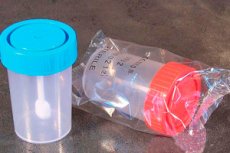Medical expert of the article
New publications
Blood in feces: causes, symptoms, diagnosis, treatment
Last reviewed: 04.07.2025

All iLive content is medically reviewed or fact checked to ensure as much factual accuracy as possible.
We have strict sourcing guidelines and only link to reputable media sites, academic research institutions and, whenever possible, medically peer reviewed studies. Note that the numbers in parentheses ([1], [2], etc.) are clickable links to these studies.
If you feel that any of our content is inaccurate, out-of-date, or otherwise questionable, please select it and press Ctrl + Enter.

Blood in the stool is the most alarming and serious sign of diseases of the intestinal tract (anal area, anal canal, rectum).
Blood in the stool can be detected in various pathological processes occurring in different parts of the intestinal tract. Therefore, the symptoms of diseases can be varied.
Why is there blood in the stool?
The appearance of blood from the anus can be a sign of diseases that do not threaten the life of an adult or a child, as well as a symptom of extremely serious diseases in which you cannot delay in contacting a doctor.
Blood in the stool of an adult and a child is the first sign that indicates a violation of the integrity of the intestinal tract vessels and mucous membrane. But it should also be remembered that the presence of a red liquid resembling blood in the stool is not always blood. In some cases, a change in the color of the stool is considered to be the cause of eating all kinds of food products, including gelatin-based desserts, beets, tomatoes, and sweet peppers. As a result, when the stool turns red, you should not start to panic. First of all, it is recommended to think about what foods have been consumed over the past 2-3 days.
Diseases in which blood may be found in the stool:
- Anal fissure
- Haemorrhoids
- Cryptite
- Proctitis
- Rectal polyps (tumors on the surface of the intestinal mucosa)
- Rectal cancer in the decay stage
- Cancer of other parts of the intestinal tract and stomach
- Diverticula of the intestinal tract (diverticulosis, diverticulitis)
- Ulcer of the stomach and/or duodenum
- Non-specific ulcerative colitis
- Terminal ileitis of various origins
- Crohn's disease
- Varicose veins of the esophagus (extremely rare)
- Cirrhosis
- Parasitic diseases of the intestinal tract
- Infectious causes of blood in stool (dysentery, amebiasis)
- Endometriosis involving the colon mucosa (interrelation of bleeding with menstruation)
- Anal sex and the introduction of any foreign body into the anus that damages the mucous membrane of the rectum
- Side effects of medications (antibiotics and some potassium-containing medications can cause ulceration of the intestinal tract and bleeding, and as a result, blood in the stool)
- Any abnormalities of the vessels of the intestinal tract (hemangioma, etc.)
The detection of blood in stool and on paper is almost always considered a serious and ominous sign that requires the participation of a doctor, since a person will not be able to independently detect the exact source of bleeding and choose adequate treatment without a professional examination and without an examination.
Who to contact?
What tests are important if you find blood in your stool?
A proctologist consultation usually includes a digital rectal examination and, if necessary, a rectoscopy. If in doubt, endoscopic or X-ray examinations of the entire colon may be performed.
The color of the blood in the stool will depend on which part of the gastrointestinal tract the blood comes from. The closer the bleeding area is to the anus, the brighter the blood.
The presence of bright red fresh blood in the stool indicates bleeding in the lower parts of the intestinal tract (hemorrhoids, anal fissures, rectal tumors, etc.). Often, with these diseases, scarlet blood also remains on toilet paper and even on underwear.
It is extremely important to know that rectal bleeding is one of the main signs not only of hemorrhoids, but also of colon cancer, metastases of other malignant tumors to the liver.
Treatment
Treatment for blood in the stool will depend on the pathology detected, because all these diseases require a completely different approach to their treatment.
If you find blood in your stool or on toilet paper, you should contact a proctologist as soon as possible for a more detailed examination. A full examination is essential in all cases of stool color changes, so as not to miss dangerous diseases!
Don't forget: normally, blood is not found in stool!


 [
[